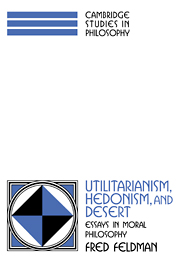7 - On the intrinsic value of pleasures
Published online by Cambridge University Press: 05 June 2012
Summary
INTRODUCTORY COMMENTS
Essay 7 has a “negative” aim and a “positive” aim.
In the first several sections of the essay, I explain one of the most influential current views about the nature of pleasure. This is the view of Sidgwick, Brandt, Alston, and others, according to which a feeling is correctly said to be a pleasure if the person who has that feeling likes it for its own sake, or enjoys it, or wants it to continue, or (in Sidgwick's words) “apprehends it as desirable in itself.” In general, according to this view, any sort of feeling might be a pleasure – it doesn't matter how it “feels.” A feeling is a pleasure if the one who feels it has an appropriate attitude toward it when he or she has it.
My negative aim in the essay is to show that it is impossible to combine any such “Sidgwickian” conception of pleasure with the classic Moorean conception of intrinsic value. The problem, in the abstract, is simple: On the Moorean conception of intrinsic value, intrinsically good things are supposed to have their values in virtue of their own intrinsic natures – because of the way they are “in themselves.” Yet on the Sidgwickian conception of pleasure, no feeling is “intrinsically a pleasure.” If a feeling happens to be a pleasure, it is so because of an extrinsic feature – the one who experiences it has the appropriate attitude toward it.
- Type
- Chapter
- Information
- Utilitarianism, Hedonism, and DesertEssays in Moral Philosophy, pp. 125 - 148Publisher: Cambridge University PressPrint publication year: 1997
- 1
- Cited by

